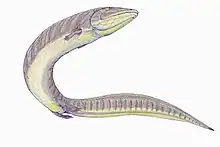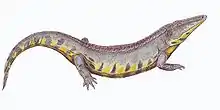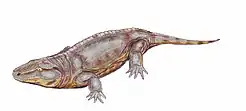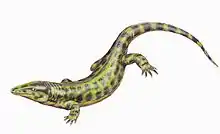Discosauriscus
Discosauriscus was a small seymouriamorph[1] which lived in what is now Central and Western Europe in the Early Permian Period. Its best fossils have been found in the Broumov and Bačov Formations of Boskovice Furrow, in the Czech Republic.
| Discosauriscus Temporal range: | |
|---|---|
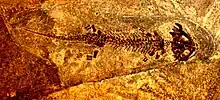 | |
| Discosauriscus austriacus | |
| Scientific classification | |
| Domain: | Eukaryota |
| Kingdom: | Animalia |
| Phylum: | Chordata |
| Order: | †Seymouriamorpha |
| Family: | †Discosauriscidae |
| Genus: | †Discosauriscus Kuhn, 1933 |
| Species | |
| |
| Synonyms | |
| |
Classification


Discosauriscus belongs to the order Seymouriamorpha, and is the type genus of the family Discosauriscidae. Currently recognised are two valid species - Discosauriscus austriacus and Discosauriscus pulcherrimus. Letoverpeton is a junior synonym of Discosauriscus.[2]
Characteristics
Discosauriscids were long thought to be known from larval or neotenic forms,[3] and three ontogenetic stages had been distinguished.[4] However, more recent studies concluded that some subadult, probably terrestrial specimens were known,[5][6] so the case for neoteny in this taxon is not as well-supported as once thought. Discosauriscus had wide jaws with sharp teeth, short limbs and relatively long tail.[7] The phalangeal formula was 2-3-4-5-3 for both hind- and forelimbs. The body was covered with rounded scales with concentric rings, and a well-preserved lateral-line system has been described.[4]
Discosauriscus may have had electroreceptive organs.[8]
References
- Panchen, A. L. and Smithson, T. R. 1988. The relationships of the earliest tetrapods. Pp. 1-32 in Benton, M. J. (ed), The Phylogeny and Classification of the Tetrapods, Volume 1: Amphibians, Reptiles, Birds. Clarendon Press, Oxford.
- Klembara, Jozef (1997). "The cranial anatomy of Discosauriscus Kuhn, a seymouriamorph tetrapod from the Lower Permian of the Boskovice Furrow (Czech Republic)". Philosophical Transactions of the Royal Society of London, Series B. 352: 257–302. Bibcode:1997RSPTB.352..257K. doi:10.1098/rstb.1997.0021. PMC 1691931.
- Carroll, R.L. 1988. Vertebrate Paleontology and Evolution, pp 176. WH Freeman and Company, New York ISBN 0-7167-1822-7
- Klembara, Jozef. 1996. Discosauriscus. Version 1 January 1996. http://tolweb.org/Discosauriscus/17544/1996.01.01 in The Tree of Life Web Project, http://tolweb.org/
- Sanchez, S; Klembara, J; Castanet, J; Steyer, JS (2008). "Salamander-like development in a seymouriamorph revealed by palaeohistology". Biology Letters. 4: 411–414. doi:10.1098/rsbl.2008.0159. PMC 2610144. PMID 18460423.
- Kriloff, A.; Germain, D.; Canoville, A.; Vincent, P.; Sache, M.; Laurin, M. (2008). "Evolution of bone microanatomy of the tetrapod tibia and its use in palaeobiological inference". Journal of Evolutionary Biology. 21 (3): 807–826. doi:10.1111/j.1420-9101.2008.01512.x. PMID 18312321.
- dinosaurier-news - Discosauriscus: Ein Amphibium aus der Permzeit Archived 8 July 2012 at archive.today
- Klembara, J, Electroreceptors in the Lower Permian tetrapod Discosauriscus austriacus, Palaeontology, Vol 37, part 3, (1994)
